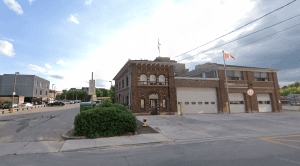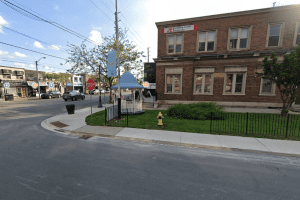The Fire Hall in New Toronto is at Eighth St. just north of Lake Shore Blvd. West
In a previous post I wrote about the Fire Hall that used to exist in Long Branch. The current post features the Fire Hall that remains in operation in New Toronto.
128 Eighth St.
Google Maps link: 128 Eighth St.
Mike James of Niagara-on-the-Lake, who grew up in New Toronto, has recently mentioned that the Fire Hall in New Toronto still stands on Eighth St. just north of Lake Shore Blvd. West.
135 Eighth St.
Google Maps link: 135 Eighth St.
Mike has also commented that
Also here you can see the old New Toronto hydro office on the right and across the street, used to be the Brown Building where town council worked prior to its demolition as a strip mall in the early 60’s.
Town Hall of New Toronto was located at Eighth St. and Lake Shore Blvd. West
Mike has noted, as well, that the Etobicoke Historical Society features a photo of the Town Hall which used to be located on Lake Shore Blvd. West not far from where the Fire Hall is located.

Town Hall of New Toronto (demolished). Brown building at the south-west corner of Lake Shore Blvd. West at Eighth St. Photo source: Etobicoke Historical Society website
Book about urban governance by Mariana Valverde
When I think about New Toronto I think among other things about a book about urban governance by Mariana Valverde; the book is highlighted at a previous post entitled:
An excerpt from a blurb for the book reads:
If urban diversity is to be truly inclusive – of tenants as well as homeowners, and recent immigrants as well as longtime residents – cities must move beyond micro-local planning and embrace a more expansive, citywide approach to planning and regulation.
The book makes a good point: It’s important that tenants and recent immigrants have a voice along with everyone else when land use decisions are made in Toronto and elsewhere.
I no longer have much involvement with local Toronto planning issues. However, some meetings that I’ve attended online in recent years have impressed me with one thing above all.
I’ve noticed that City of Toronto planners have on occasion made a really strong effort to ensure that a diversity of voices are heard, rather than solely the voices of well-established and articulate homeowners. The latter category of citizens has valuable and insightful feedback to offer, when planning decisions are made. However, they should not be the only ones to be heard.
Every person, whether articulate in a standard way or not, whether a homeowner or not, deserves to have the opportunity to express their views. Each of us deserves to have our views be taken closely into account, when decisions that directly affect us are being made.
The book I mention, Everyday Law on the Street: City Governance in an Age of Diversity (2012), is worth a close read. I’m pleased the book was recommended to me many years ago when I lived in Long Branch.
Variations of populism
The question of who gets listened to, or not – in various circumstances, and in various parts of the world – brings to mind the widely cited academic work of Cas Mudde and others regarding the phenomenon of populism.
A 2012 Cambridge University Press article that I’ve been reading lately is entitled: “Exclusionary vs. Inclusionary Populism: Comparing Contemporary Europe and Latin America.”
An excerpt from the article gives a reader a sense of how Cas Mudde and colleagues approach such a topic:
While populism always entails both exclusionary and inclusive features, different types of populism can be distinguished on the basis of this distinction. Today, European populism is predominantly exclusive, while Latin American populism is chiefly inclusive. Two factors are crucial for understanding these different regional patterns: on the one hand, the way in which populist actors define who belongs to ‘the people’ vis-à-vis ‘the elite’, and on the other hand, the ideological features that are attached to the particular populist ideology of the actors. In addition, we will show that despite the differences between the two types of populism, both share a problematic relationship with liberal democracy and strive for the repoliticization of specific issues, that is, topics that intentionally or unintentionally are not being addressed by the establishment.
I came across Mudde’s work in Blue Storm (2023), one of several books I’ve been reading in recent months about the history of Alberta.
For an ongoing multiyear biography project about a speech therapist who lived in Alberta, I’ve been reading intensively about Alberta’s history with a focus on how such a regional history relates to the history of Canada and the world.
A multitude of valuable resources that I’ve been studying closely include God’s Province (2016), Orange Chinook (2019), and Blue Storm (2023).
The latter two texts are available online at the University of Calgary website. The online versions are handy but the print versions are easier to read in my experience. Nonetheless the online versions offer a great way to get acquainted with Orange Chinook and Blue Storm – valuable resources featuring the work of many authors.
Also of interest: First World Petro-Politics (2016), Fundamentalism and American Culture (2022), Rule of Darkness (1988), Dark Vanishings (2003), and Time’s Monster (2020).



Leave a Reply
Want to join the discussion?Feel free to contribute!